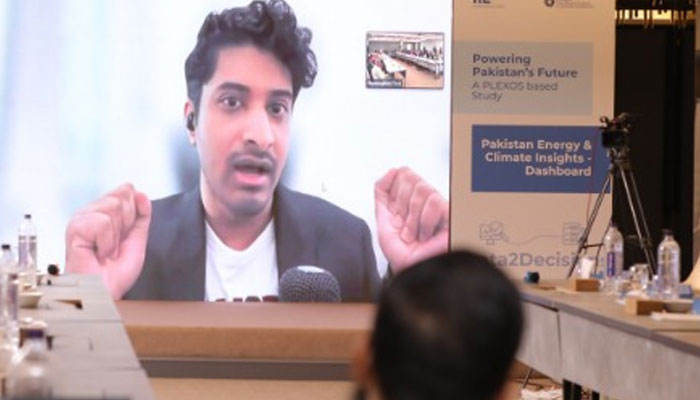Renewables First webinar explores sustainability in green hydrogen development
KARACHI: Renewables First, a think tank for energy and environment in Pakistan, hosted a comprehensive webinar ‘Incorporating Sustainability in Green Hydrogen Advancements’ on Thursday, gathering leading experts, researchers and policymakers to discuss the pivotal role of sustainability in Pakistan’s emerging green hydrogen economy.
The event highlighted the need for sustainable practices in developing green hydrogen, with an eye towards Pakistan’s future potential in the sector.
Speakers said that reaching net-zero carbon emissions by 2050 requires tackling emissions from hard-to-decarbonise sectors, including ammonia production, oil refinery desulfurisation and steel manufacturing. Green hydrogen, produced using renewable energy, is seen as a key technology in this shift towards a low-carbon economy.
Afaf Ali, associate at Renewables First, projected that by 2050, Pakistan could produce green hydrogen at a competitive cost of $0.6-$1.6 per kilogramme, presenting significant export opportunities to Asian markets. She also underscored how green hydrogen projects could alleviate water scarcity through desalination of seawater, which would benefit both drinking and agricultural needs. However, she cautioned that transparent legal frameworks are essential for strategic and sustainable development in the sector.
Energy and Climate Researcher at Germany’s Oeko-Institut Susanne Krieger spoke on the distinctions between green and sustainable hydrogen, highlighting the need for resource efficiency and balanced land use to ensure socio-economic benefits accompany hydrogen production.
Partner and Country Lead for ESG, Climate Change, and Decarbonisation at KPMG-Pakistan Syed Ahson Ali Shah discussed the importance of integrating environmental, social, and governance (ESG) considerations into decarbonisation efforts.
He noted that the Securities and Exchange Commission of Pakistan (SECP) plans to implement ESG regulations in the coming year, setting a regulatory framework for sustainable business practices in Pakistan. Chief of the Sustainable Development Goals (SDGs) Unit at the Ministry of Planning, Development, and Special Initiatives (MoPDSI) Dr Muhammad Ali Kemal addressed the current progress on the SDGs. He said that green hydrogen initiatives, alongside developing carbon markets, are critical for advancing Pakistan’s sustainable economic development.
The webinar concluded with an interactive Q&A session. The discussion underscored the importance of aligning Pakistan’s hydrogen initiatives with global sustainability standards while addressing local challenges like energy poverty and social inequality.
-
 King Charles, Princess Anne, Prince Edward Still Shield Andrew From Police
King Charles, Princess Anne, Prince Edward Still Shield Andrew From Police -
 US Set To Block Chinese Software From Smart And Connected Cars
US Set To Block Chinese Software From Smart And Connected Cars -
 Carmen Electra Says THIS Taught Her Romance
Carmen Electra Says THIS Taught Her Romance -
 Leonardo DiCaprio's Co-star Reflects On His Viral Moment At Golden Globes
Leonardo DiCaprio's Co-star Reflects On His Viral Moment At Golden Globes -
 SpaceX Pivots From Mars Plans To Prioritize 2027 Moon Landing
SpaceX Pivots From Mars Plans To Prioritize 2027 Moon Landing -
 King Charles Still Cares About Meghan Markle
King Charles Still Cares About Meghan Markle -
 J. Cole Brings Back Old-school CD Sales For 'The Fall-Off' Release
J. Cole Brings Back Old-school CD Sales For 'The Fall-Off' Release -
 GTA 6 Built By Hand, Street By Street, Rockstar Confirms Ahead Of Launch
GTA 6 Built By Hand, Street By Street, Rockstar Confirms Ahead Of Launch -
 Funeral Home Owner Sentenced To 40 Years For Selling Corpses, Faking Ashes
Funeral Home Owner Sentenced To 40 Years For Selling Corpses, Faking Ashes -
 Why Is Thor Portrayed Differently In Marvel Movies?
Why Is Thor Portrayed Differently In Marvel Movies? -
 Dutch Seismologist Hints At 'surprise’ Quake In Coming Days
Dutch Seismologist Hints At 'surprise’ Quake In Coming Days -
 Australia’s Liberal-National Coalition Reunites After Brief Split Over Hate Laws
Australia’s Liberal-National Coalition Reunites After Brief Split Over Hate Laws -
 DC Director Gives Hopeful Message As Questions Raised Over 'Blue Beetle's Future
DC Director Gives Hopeful Message As Questions Raised Over 'Blue Beetle's Future -
 King Charles New Plans For Andrew In Norfolk Exposed
King Charles New Plans For Andrew In Norfolk Exposed -
 What You Need To Know About Ischemic Stroke
What You Need To Know About Ischemic Stroke -
 Shocking Reason Behind Type 2 Diabetes Revealed By Scientists
Shocking Reason Behind Type 2 Diabetes Revealed By Scientists




